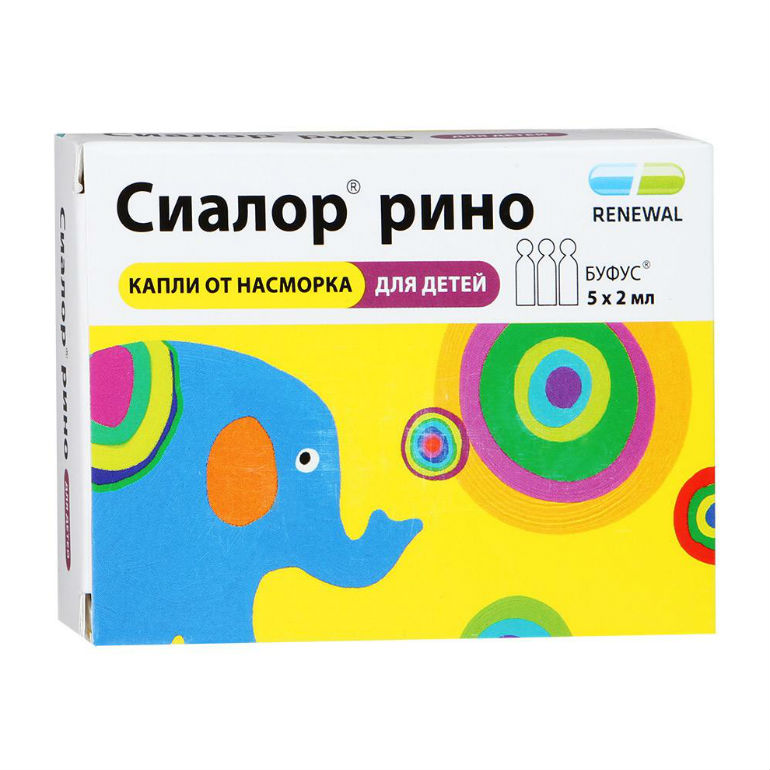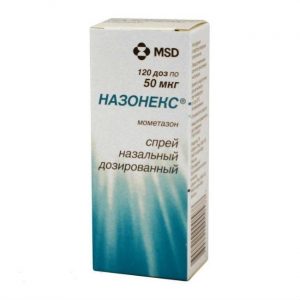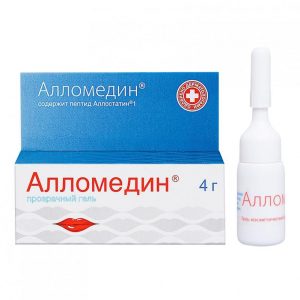Description
Release form
nasal drops.
Pharmacological action
Oxymethazoline belongs to the group of alpha-adrenostimulants for topical use. It has a vasoconstrictor effect. With intranasal administration it reduces swelling of the mucous membrane of the upper respiratory tract and discharge from the nose. Restores nasal breathing. Elimination of swelling of the mucous membrane of the nasal cavity helps to restore aeration of the paranasal sinuses of the nasal cavity, middle ear cavity, which reduces the likelihood of bacterial complications (sinusitis, sinusitis, otitis media). With local intranasal administration at therapeutic concentrations, it does not irritate and does not cause hyperemia of the nasal mucosa. The drug begins to act quickly, within a few minutes. The duration of the drug is up to 12 hours.
Pharmacokinetics
With topical intranasal administration, oxymetazoline does not have a systemic effect. The half-life of oxymetazoline with its intranasal administration is 35 hours. 2.1% oxymetazoline is excreted in the urine and about 1.1% with feces.
Indications
treatment of acute respiratory infections accompanied by a runny nose
allergic rhinitis
vasomotor rhinitis
to restore drainage with inflammation of the paranasal sinuses of the nasal cavity, eustachitis, otitis media in order to eliminate edema.
Contraindications
hypersensitivity to the components of the
preparation atrophic (dry) rhinitis
taking monoamine oxidase inhibitors during the previous 2 weeks and within 2 weeks after they were canceled
closed-angle glaucoma in the brain (for surgical intervention)
condition after transsphenoid hypophysectomy
Precautions
In patients with increased intraocular pressure, suffering from diseases of the cardiovascular system (arterial hypertension NZI, coronary heart disease, chronic heart failure, tachycardia, arrhythmias), impaired carbohydrate metabolism (diabetes mellitus), impaired thyroid function (hyperthyroidism), pheochromocytoma, chronic renal failure, prostatic hyperplasia (urinary retention), severe atherosclerosis, porphyria, pregnancy, breast-feeding, as well as patients taking tricyclic antidepressants and bromocriptine.
Special instructions
Use the recommended dose without consulting a doctor for more than 7 days. If symptoms intensify or improvement does not occur within 3 days, you should consult your doctor. Avoid contact with eyes.
To avoid the spread of infection, you must use the drug individually. After opening, use within 14 days.
With prolonged use and an overdose of oxymetazoline, the therapeutic effect may be weakened, and the risk of reactive hyperemia (drug rhinitis) and atrophy of the nasal mucosa is also increased.
Effect on the ability to drive vehicles,
mechanisms After prolonged use of rhinitis medicines containing oxymetazoline in doses exceeding the recommended ones, the general effect on the cardiovascular system and central nervous system cannot be ruled out. In these cases, caution is advised when driving vehicles and engaging in other potentially dangerous activities that require increased concentration of attention and speed of psychomotor reactions.
Composition
Composition per 1 ml:
Active ingredient:
Oxymethazoline hydrochloride – 0, 25.
Excipients:
benzalkonium chloride – 0.15 mg,
disodium edetate (trilon sodium hydroxide – 0.5 mg srdl) (0.1 M sodium hydroxide solution) – up to pH 6.0-7.0,
sodium dihydrogen phosphate dihydrate (sodium phosphate monosubstituted 2-water) – 1.29 mg,
sodium hydrogen phosphate dodecahydrate (sodium phosphate disubstituted 12-water) – 1.76 mg, purified
water – up to 1 ml.
Dosage and Administration
Intranasally.
Adults and children over 6 years of age: use 1-2 drops 0, 05% solution in each nasal passage 2-3 times a day.
It is not recommended to use the drug for more than 7 days. With frequent and prolonged use of the drug, a feeling of nasal congestion may reappear or worsen. If these symptoms appear, discontinue treatment and consult a doctor.
Side effects
Burning or dryness of the mucous membranes of the nasal cavity, dryness of the mucous membranes of the oral cavity and throat sneezing increase in the volume of secretions secreted from the nose, nosebleeds after how will the effect of using the drug pass, a strong feeling of nasal congestion (reactive hyperemia).
Side effects due to the systemic effect of the drug: increased blood pressure, headache, dizziness, palpitations, tachycardia, anxiety, anxiety, fatigue, drowsiness, sedation, irritability, sleep disturbances (in children), nausea, insomnia, exanthema, visual impairment (in contact with eyes), hallucinations, Quincke’s edema, itching, convulsions, respiratory arrest (in infants). With prolonged use – tachyphylaxis, reactive hyperemia of the mucous membrane and atrophy of the mucous membrane of the nasal cavity.
Preservative benzalkonium chloride, which is part of the drug, can cause swelling of the mucous membrane of the nasal cavity. If this happens, you need to change the drug to another, preservative free.
If you have any side effects that are indicated in the instructions or are aggravated, or you notice any other side effects that are not listed in the instructions, inform your doctor.
Drug Interactions
When used simultaneously with monoamine oxidase inhibitors (including a period of 14 days after they are withdrawn), tricyclic antidepressants, or other drugs that increase blood pressure, an increase in blood pressure may occur. The drug slows down the absorption of local anesthetics, lengthens their effect.
Co-administration of other vasoconstrictor drugs increases the risk of side effects.
If you are using the above or other medications (including over-the-counter), consult your doctor before using Sialor®Rino.
Overdose of
If you accidentally take the drug inside or overdose, the following symptoms may appear: anxiety, anxiety, hallucinations, convulsions, lowering body temperature, lethargy, drowsiness, coma, constricted or dilated pupils, fever, sweating, pallor, cyanosis, sensation bradycardia, arrhythmia, cardiac arrest, increased blood pressure, decreased blood pressure, nausea, vomiting, respiratory depression, respiratory arrest.
Treatment: symptomatic. In case of accidental ingestion – gastric lavage, intake of activated carbon. Vasopressor drugs are contraindicated.
Storage conditions
In a dark place at a temperature not exceeding 25 C.
Keep out of the reach of children.
Deystvuyuschee substances
oxymetazoline
Terms and conditions
without prescription
Dosage form
nasal drops
Appointment
Children’s forms



